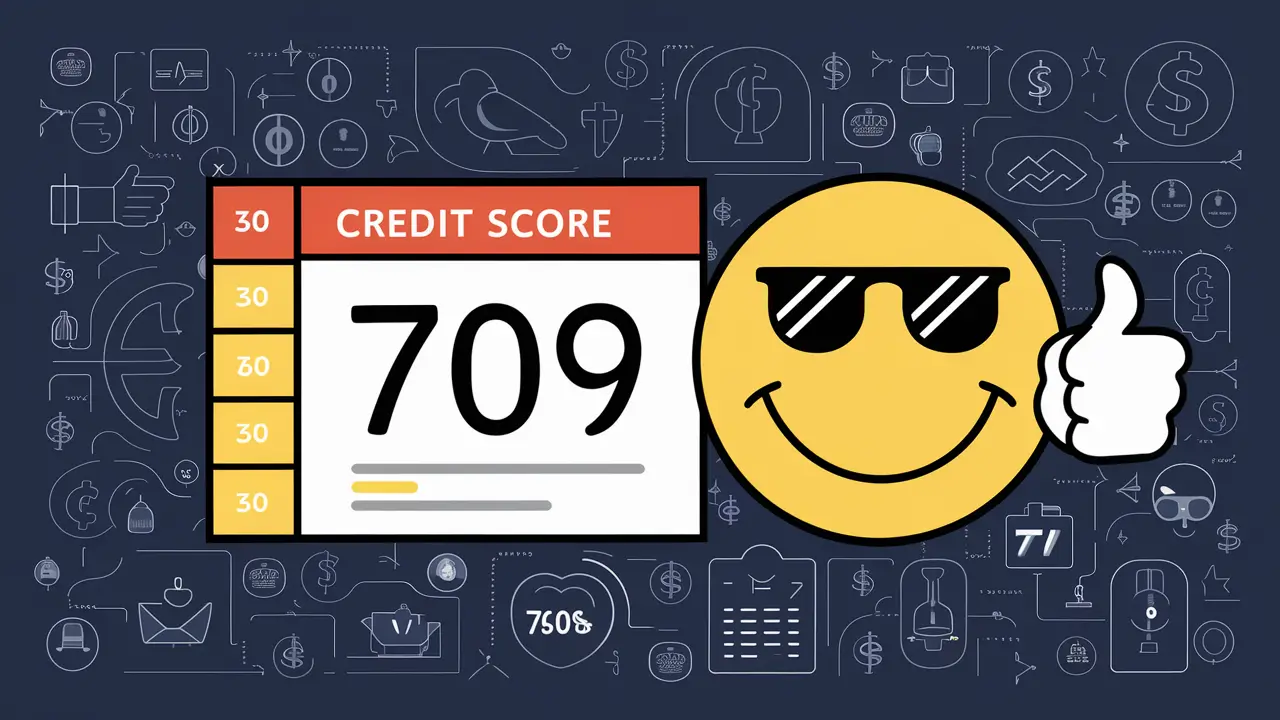-
Posted on: 25 Jul 2024

-
Your credit score plays a crucial role in your financial life, influencing everything from loan approvals to interest rates. Understanding where your score falls within the credit score ranges is essential for making informed financial decisions. This guide will explore what a credit score of 709 means, the advantages it offers, and how you can further improve your score.
Understanding Credit Scores and Their Importance
A credit score is a three-digit number that represents your creditworthiness. It's based on your credit history, including your payment history, amounts owed, length of credit history, credit mix, and new credit. Lenders use this score to assess the risk of lending you money.
Why is a Good Credit Score Important?
A good credit score opens doors to various financial opportunities, including:
- Lower Interest Rates: You'll qualify for lower interest rates on loans, mortgages, and credit cards, saving you money over time.
- Higher Credit Limits: Lenders are more likely to offer higher credit limits to individuals with good credit scores.
- Better Loan Terms: You'll have access to more favorable loan terms, such as longer repayment periods and lower fees.
- Easier Approval for Loans and Credit Cards: A good credit score significantly increases your chances of getting approved for loans and credit cards.
- Rental Opportunities: Landlords often check credit scores when evaluating rental applications. A good score can give you an edge.
- Insurance Rates: Some insurance companies use credit scores to determine premiums. A good score may result in lower insurance rates.
- Job Opportunities: Some employers may check credit scores as part of the hiring process, especially for positions that involve financial responsibilities.
What Does a Credit Score of 709 Mean?
A credit score of 709 generally falls within the "good" credit score range. While the exact ranges may vary slightly depending on the credit scoring model used (FICO or VantageScore), a 709 score typically indicates that you have a solid credit history and are considered a relatively low-risk borrower.
FICO Score Ranges:
- Exceptional: 800-850
- Very Good: 740-799
- Good: 670-739
- Fair: 580-669
- Poor: 300-579
VantageScore Ranges:
- Excellent: 750-850
- Good: 700-749
- Fair: 650-699
- Poor: 300-649
As you can see, with a 709 credit score, you're bordering on the "very good" range according to the FICO model, and are in the "good" range according to VantageScore. This is a strong position to be in.
Benefits of Having a 709 Credit Score
With a credit score of 709, you can enjoy several benefits, including:
Access to Better Interest Rates
Lenders offer more competitive interest rates to borrowers with good credit scores. This can save you a significant amount of money on loans and credit cards over time. For example, a lower interest rate on a mortgage can translate to thousands of dollars in savings over the life of the loan.
Higher Approval Odds
You'll have a much higher chance of getting approved for loans and credit cards with a 709 credit score compared to someone with a lower score. This can be particularly important when applying for a mortgage or a car loan.
Favorable Loan Terms
Lenders are more likely to offer favorable loan terms, such as longer repayment periods and lower fees, to borrowers with good credit. This can make your loan more manageable and affordable.
Access to Premium Credit Cards
Many premium credit cards with attractive rewards programs and benefits require a good to excellent credit score. With a 709 score, you'll likely qualify for these cards, allowing you to earn rewards on your spending and enjoy perks like travel insurance and purchase protection.
Increased Financial Flexibility
A good credit score provides you with greater financial flexibility. You'll have more options available to you when it comes to borrowing money, allowing you to take advantage of opportunities and navigate unexpected expenses.
How to Improve Your Credit Score Further
While a 709 credit score is good, there's always room for improvement. Boosting your score even higher can unlock even better interest rates and financial opportunities. Here are some strategies to consider:
Pay Bills on Time
Payment history is the most significant factor in your credit score. Make sure to pay all your bills on time, every time. Consider setting up automatic payments to avoid missing deadlines.
Keep Credit Utilization Low
Credit utilization refers to the amount of credit you're using compared to your total available credit. Aim to keep your credit utilization below 30%. For example, if you have a credit card with a $1,000 limit, try to keep your balance below $300.
Monitor Your Credit Report Regularly
Check your credit report regularly for errors or inaccuracies. You can obtain a free copy of your credit report from each of the three major credit bureaus (Equifax, Experian, and TransUnion) annually through AnnualCreditReport.com. If you find any errors, dispute them with the credit bureau immediately.
Avoid Opening Too Many New Accounts
Opening too many new credit accounts in a short period of time can negatively impact your credit score. Each time you apply for credit, it triggers a hard inquiry on your credit report, which can slightly lower your score. Limit your credit applications to only those you truly need.
Maintain a Good Credit Mix
Having a mix of different types of credit accounts, such as credit cards, installment loans, and a mortgage, can demonstrate to lenders that you can manage different types of debt responsibly. However, don't open new accounts just for the sake of diversifying your credit mix.
Become an Authorized User
If you have a friend or family member with a credit card who has a good payment history and low credit utilization, you can ask them to add you as an authorized user on their account. This can help you build credit, especially if you have a limited credit history.
Consider a Secured Credit Card
If you have a limited or poor credit history, a secured credit card can be a good way to build or rebuild your credit. With a secured credit card, you'll need to provide a security deposit, which typically serves as your credit limit. By making timely payments, you can gradually improve your credit score.
Common Mistakes to Avoid That Can Hurt Your Credit Score
Even with a good credit score, it's important to avoid common mistakes that can negatively impact your credit:
- Making Late Payments: Late payments are one of the most damaging things you can do to your credit score.
- Maxing Out Credit Cards: High credit utilization can significantly lower your score.
- Ignoring Debt: Ignoring debt and failing to address collection accounts can have a long-lasting negative impact.
- Closing Old Credit Accounts: Closing old credit accounts can reduce your overall available credit, potentially increasing your credit utilization.
- Co-signing Loans for Others: If the borrower defaults on the loan, you'll be responsible for repaying the debt, which can negatively impact your credit.
Maintaining a Healthy Credit Profile
Building and maintaining a healthy credit profile is an ongoing process. By following the tips outlined in this guide and avoiding common mistakes, you can ensure that your credit score remains strong and that you continue to enjoy the benefits of good credit. Remember to regularly monitor your credit report, pay your bills on time, and keep your credit utilization low.











